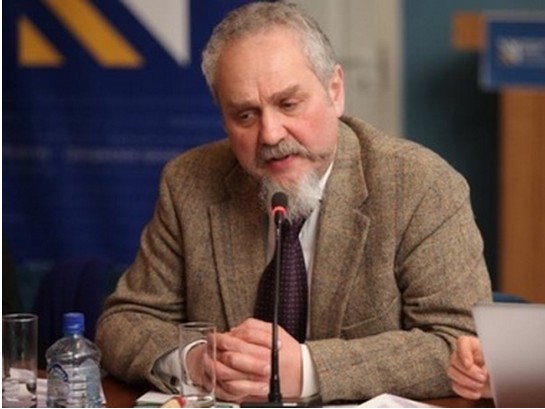On September 16, a law on the special status of certain regions of Donetsk and Luhansk Oblasts was passed at a closed session of the Verkhovna Rada of Ukraine. According to the document, a "special order of self-governance" is being implemented for three years since the date of the law's adoption. Andrei Zurabov, who has a PhD in History and is a professor at MGIMO (Moscow State Institute of International Relations), tells what consequences this decision will have for Ukraine and Russia, in his interview with Gordon.
– Andrei Borisovich, the law that was passed yesterday [16.09.2014] by the Ukrainian parliament on the special status of some territories has evoked a mixed reaction within Ukrainian society. In your mind, would Russia or Ukraine gain from this law?
– The law on special status is a forced compromise. Overall, I think that this is a correct compromise given the situation, as not only does it concern Ukraine, but also Russia. The thing is that Ukraine could not fight with Russia, while Russia was ready to continue the war in Ukraine. Even though the sanctions were doing their job, the death of Russian soldiers has shocked society, the economy was collapsing. Russia wanted to continue the war, but could not do so any longer. Russia could not fight due to one reason, and Ukraine could not fight due to another. This situation, of course, necessitates a compromise.
– Nevertheless, Russian television is proclaiming its victory regarding the adoption of these laws for everybody to hear. Is that the case? And can it be that this victory would actually turn out to be Pyrrhic?
– This is a three-year temporary peace. I think this is quite correct. This is a good opportunity for Ukraine to isolate herself from the radicalism of the separatists, and an opportunity to build in Ukraine a social model which would, in the end, be more appealing even to the population of these zones. However, for Russia, the presence of such two enclaves at its border is quite a dangerous thing for the current government, because this will be a right-wing radicalism, which would be more ideological, although mad, but ideological nonetheless, as opposed to Putin's kleptocratic present-day authority and that of his associates. And it will be very dangerous for Putin's regime. It will be dangerous due to the fact that these people are infected with the ideas of extreme nationalism, [perpetuating] that Russia should be a great empire. This absolutely does not correspond with the interests of Putin's elite, which generally uses all of these slogans only for practical purposes, in order to rule and enrich themselves comfortably. Whereas now it would be pressurized by these quasi-independent enclaves. Unfortunately, even Strelkov is already quite popular in Russian society. He is seen as a hero by a great number of people, while Putin is no hero. This will be a useful factor for Ukraine.
Due to the war stopping, Ukraine can now direct all of its forces towards restoring the country, not only economically, but first and foremost socially and politically, towards the integration into the European Union, and of course, into NATO, and towards re-equipping the army. For Russia however, the presence of these enclaves would be damaging. And in addition to this, one should not forget that they [the enclaves] would need to be fed. These will be subsidized regions, people would have to be provided with everything, and humanitarian convoys would be constantly driving there. So this will be a very tough time for Russia with its stagnating economy.
– Nonetheless, the rhetoric in the discussion of this law is talking about a split in the Ukrainian political elite...
– It should be taken into account that one of Putin's aims, as I have heard this more than once in our political elite during the discussions, is to split Ukrainian society and sow distrust towards Petro Poroshenko by the means of this law. As though he is some sort of a collaborationist, who is co-operating with Russia and giving up Ukraine, etc. This is one of the aims - to create an image of an enemy by co-operating with the enemy.
– So, in other words, Russia did not achieve its military goals in Ukraine and is now trying to destroy us from within....
– [Russia] sought to achieve that Ukraine would not join the EU and NATO, as a result Ukraine has gone to the EU and NATO. [Russia] sought to achieve that NATO would not approach Russia's frontiers, as a result NATO is approaching Russia's frontiers. NATO forces are not only being brought into Ukraine, but also to Finland, Sweden, the Baltics and Poland. Therefore, the goals aren't achieved. [Russia] sought to restore a collaborationist Yanukovych type of regime in Ukraine, but didn't succeed. Democratic presidential elections were held, and the strong and responsible figure of Petro Poroshenko emerged.
Now the elections in the [Verkhovna] Rada are due to be held. I am hoping that they will also add legitimacy to Ukrainian society. Hence, the absolute collapse of Russian politics in everything, and the creation of these Luhansk and Donetsk enclaves, which would exist for a few years, is yet another failure of Russian policy. And I generally get the impression that this process, that is happening between Ukraine and Russia, is significant in a way that Ukraine is unwillingly playing the role of a grave digger for Putin's Regime in Russia.





